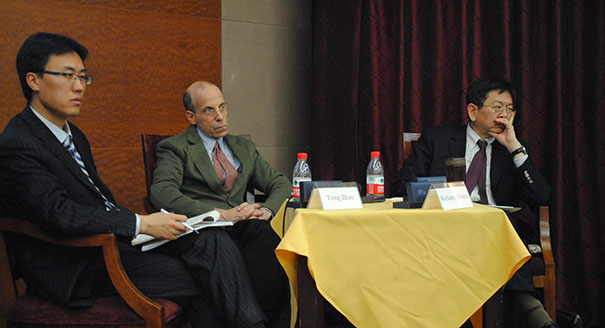Registration
You will receive an email confirming your registration.
Washington, Beijing, and Moscow hold dissimilar and sometimes opposing views on several security issues, including ballistic missile defense and tactical nuclear weapons. Russia insists that deepening global arms control requires a more multilateral approach and both Moscow and Beijing remain wary of emerging U.S. conventional prompt global strike weapons. The conflict in Ukraine and the chill in U.S.-Russian relations have further complicated cooperation on security matters.
Richard Weitz described the current dimensions of U.S.-China-Russia trilateral security relations and assessed the potential for both conflict and cooperation. Tong Zhao then moderated a discussion between Weitz and Xu Jian of the China Institute of International Studies.
Discussion Highlights
- Resurgent Sino-Russian Ties: Participants asserted that tense U.S.-Russian relations and closer Sino-Russian security and energy policy cooperation have changed the dynamics of trilateral relations among the three parties. They pointed out that only China currently enjoys strong diplomatic ties with both other countries. Panelists downplayed the likelihood that China and Russia will enter into a formal alliance and they emphasized that conflict is not in the interest of any of the three countries. Improved Sino-Russian relations, participants posited, could be seen as a sign of transition from U.S. unipolarity to a multipolar international system.
- Promoting Economic Growth: While Russia seeks to broaden its economic influence in former Soviet states, the United States and China, panelists explained, are promoting separate initiatives to spur economic gains in Asia. Through its pivot to Asia, the United States seeks to facilitate cooperation by strengthening relations with regional allies and encouraging trade through the Trans-Pacific Partnership negotiations. China, meanwhile, has demonstrated a commitment to broadening financing resources for developing countries through the newly established BRICS Bank and Asian Infrastructure Investment Bank. At the same time, panelists added, Beijing has committed over $16 billion to finance infrastructure projects for President Xi Jinping’s two-pronged New Silk Road plan, which includes an overland economic belt through Central Asia and a maritime route through Southeast Asia. Participants posited that China’s proposal may enjoy greater success than past U.S. attempts given the large investment that Beijing has pledged.
- Fostering Stability in Afghanistan: With the NATO military presence in Afghanistan winding down, panelists discussed the uncertainty about the role that remaining foreign military personnel will have and how long they will stay. Participants asserted that the common interest of containing Islamic extremism has prompted China and Russia to engage more in Central Asia. They noted that Moscow is contending with drug trafficking in northern Afghanistan, and Beijing has proposed a forum to facilitate dialogue between representatives from China, Afghanistan, and Pakistan Participants also pointed out that a September security pact between Afghanistan and NATO to keep 12,000 foreign troops in the country makes it highly unlikely that China or Russia will deploy forces. Panelists did suggest that there may be room for multilateral cooperation to train and equip local security forces, although whether this will occur remains to be seen.
- Nuclear Security: Nuclear nonproliferation and arms control, panelists asserted, are among the largest concerns of all three countries. Despite limited nuclear missile reductions through the START treaties, disagreement over how to deepen disarmament commitments and how to verify such gains have stalled further negotiations. Panelists explained that Russia and the United States want China to join in efforts to reduce nuclear weapon stockpiles. Beijing insists, however, that Russia and the United States further decrease their missile counts to levels comparable to China before the latter makes such a commitment. Panelists expressed concern that further gains in nuclear arms reduction may be difficult to achieve given deteriorated U.S.-Russian relations.
- New Military Technologies: New weapons and other military technologies, panelists said, are straining trilateral security relations. They observed that the United States continues to invest heavily in developing missile defensive systems and hypersonic non-nuclear missiles, which China and Russia see as potentially destabilizing to regional security. Beijing, meanwhile, has been researching anti-satellite technology that U.S. officials are afraid could disrupt U.S. military communications and intelligence capabilities. Panelists concluded that these trends will increase uncertainty and the potential for conflict if they are not managed effectively through confidence-building measures.
Richard Weitz
Richard Weitz is a senior fellow and director of the Center for Political-Military Analysis at the Hudson Institute. His current research covers regional security developments in Europe, Eurasia, and East Asia as well as U.S. defense and foreign policy. Weitz is also an expert at the global consulting network Wikistrat and a non-resident adjunct senior fellow at the Center for a New American Security.
Tong Zhao
Tong Zhao is an associate in Carnegie’s Nuclear Policy Program based at the Carnegie–Tsinghua Center for Global Policy. His research focuses on strategic security issues, including nuclear arms control, nonproliferation, missile defense, strategic stability, and China’s security and foreign policy.
Xu Jian
Xu Jian is a senior research fellow at the China Institute of International Studies (CIIS) and director of the CIIS Academic Council. He has also served as vice president of CIIS and counselor in the Chinese Permanent Mission to the United Nations.
